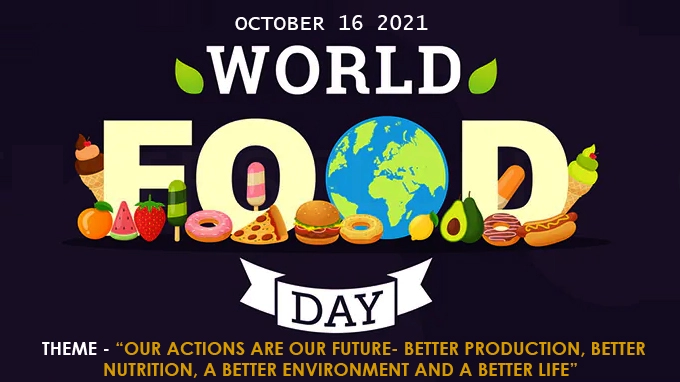World Food Day 2021 | 19 Oct 2021
Why in News
World Food Day is celebrated every year on October 16th to commemorate the date of the founding of the United Nations (UN) Food and Agriculture Organisation in 1945.
- FAO is a specialised agency of the UN that leads international efforts to defeat hunger.
- In 2021, the UN Secretary-General also convened the very first Food Systems Summit to discuss ways to transform the production and consumption of food.
Key Points
- About:
- It is observed annually to address the problem of global hunger.
- The day is also observed by organisations like World Food Programme (Was awarded nobel peace prize 2020) and International Fund for Agricultural Development.
- It emphasises on the Sustainable Development Goal 2 (SDG 2) i.e. Zero Hunger.
- It is observed annually to address the problem of global hunger.
- Need of the Hour:
- The Covid-19 pandemic has underlined that an urgent change of route is needed.
- It has made it even harder for farmers - already grappling with climate variability and extremes - to sell their harvests, while rising poverty is pushing an increased number of city residents to use food banks, and millions of people require emergency food aid.
- World needs sustainable agri-food systems that are capable of nourishing 10 billion people by 2050.
- The Covid-19 pandemic has underlined that an urgent change of route is needed.
- FAO’s Contribution in India:
- It has closely watched India's fight against malnutrition in the past decades but its scope had many constraints.
- Due to reasons such as pregnancy at a young age, lack of education and information, inadequate access to drinking water, lack of cleanliness, etc. India is lagging behind in achieving the expected results of “malnutrition free India” by 2022, envisaged under the National Nutrition Mission (POSHAN Abhiyaan).
- FAO supported India's proposal to declare 2023 as the International Year of Millets.
- The move will encourage intake of nutritious food, increase their availability further and benefit small and medium farmers who mostly grow coarse grains on their land where there is a problem of water and the land is not so fertile.
- It has closely watched India's fight against malnutrition in the past decades but its scope had many constraints.
- FAO’s Hunger Index, India’s Opposition and Farmers Protest:
- India has slipped to 101st position in the Global Hunger Index (GHI) 2021.
- However, the Indian government has questioned the poll-based assessment and methodology used by the FAO.
- India claims the methodology to be unscientific.
- On the other hand the food producers (farmers) of the country are on the roads for close to a year and are on warpath against the central government while vehemently opposing the farm laws.
- Farmers are terming the laws to be anti-peasant (food producers) and saying these laws will provide alarming loss to them which could further impact India’ ranking in combating hunger and nutrition.
- Related Indian Initiatives:
- The Eat Right India and Fit India Movement along with Swachh Bharat Abhiyan, Jal Jeevan Mission and other efforts will improve the health of Indians and heal the environment.
- Introduction of 17 new biofortified varieties of crops to overcome the shortcomings of the common variety of crops which lacks important micronutrients.
- Example: MACS 4028 Wheat, Madhuban Gajar, etc.
- Increased ambit and effective implementation of the Food Security Act, 2013.
- Amendments to the APMC (agricultural produce market committee) Acts to make them more competitive.
- Steps to ensure that farmers get one and a half times the cost as Minimum Support Price (MSP), which along with the government procurement, is an important part of ensuring the country's food security.
- Development of a large network of Farmer Producer Organisations (FPOs).
- Amendments in the Essential Commodities Act, 1955 to deal with the issue of grain wastage in India.
- Government is making efforts to make India Trans Fat free by 2022, a year ahead of the World Health Organisation (WHO) target, in synergy with the vision of New India @75 (75 years of India’s independence).
- Trans Fat is a food toxin present in Partially Hydrogenated Vegetable Oils (PHVOs) (e.g. vanaspati, shortening, margarine, etc.), baked and fried foods.
- It is a major contributor to the rise in non-communicable diseases in India and also a modifiable risk factor for Cardio-Vascular Diseases (CVD). Eliminating CVD risk factor is especially relevant during Covid-19 as people with CVD are predisposed to have serious conditions having an impact on mortality.

